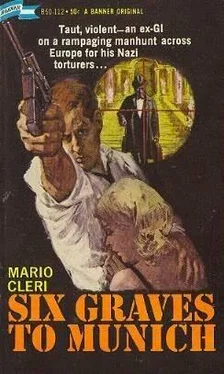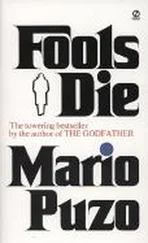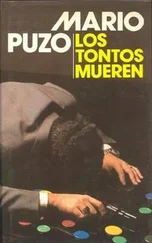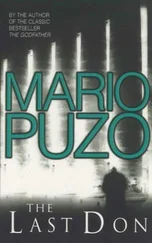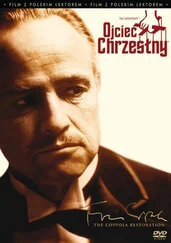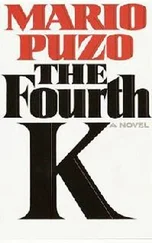He lived a drab existence in the great city. His $60 a week was barely enough to cover necessary expenses, such as the little efficiency apartment on the outskirts of Greenwich Village, frozen foods, and whiskey. He needed the whiskey to get drunk enough so that he would not dream when he slept.
Spending every working day filing dreary documents, he would come home to the shabby apartment and cook frozen foods to warm, tasteless pulp. Then he would drink half of a bottle of whiskey and sink into a sodden slumber on his rumpled bed, sometimes without taking his clothes off. And still the nightmares came. But the nightmares were not much worse than the reality had been.
In the Munich Palace of Justice they had stripped him of his dignity. They had done what the boys had threatened to do to him when he was thirteen years old, the harsh adult equivalent of taking off his trousers and hanging them on the lamppost. They had mixed laxatives with this food and that, along with the fear and the thin gruel that was called oatmeal at breakfast and stew at night, made his bowels uncontrollable; the food ran through him. When he was dragged out of his cell for the daily interrogation at the long table he could feel the seat of his pants sticky against his buttocks. He could smell the stench. But worse, he could see the cruel grins on the faces of his interrogators, and he would feel ashamed as a little boy feels ashamed. And yet in some way it made him feel closer to the seven men who were torturing him.
Now, years later, alone in his apartment, he would relive the physical indignities. He was shy and would not go out of the apartment to meet people, nor would he accept invitations to parties. He met a girl who worked as a clerk in the VA building, and with a tremendous effort of will made himself respond to her obvious interest. She came to his apartment for a drink and dinner and made it plain that she was willing to stay the night. But when Rogan went to bed with her, he was impotent.
It was a few weeks after this that his supervisor called him into the personnel office. The supervisor was a World War II veteran who thought that his job of supervising thirty file clerks proved he was mentally superior to the men under him. Trying to be kind to Rogan, he said, “Maybe this work is just a little too hard for you right now; maybe you should do some kind of physical work, like running the elevator. You know what I mean?”
The very fact that it was well intentioned made it more galling to Rogan. As a disabled veteran he had a right to appeal his discharge. The personnel officer at the conference advised him not to do so. “We can prove that you’re just not bright enough to do this job,” he told Rogan. “We have your Civil Service exam marks, and they just barely qualify you. So I think you’d be wise to take the medical discharge from government service. Then maybe if you go to night school you can do a little better.”
Rogan was so astonished that he burst out laughing. He reasoned that part of his file must be missing, or that these people thought he had filled out his forms falsely. That was it, he thought, as he saw them smiling at him. They thought he had faked everything in his educational files. Rogan laughed again and walked out of the personnel office, out of the building, out of the insultingly drab job that he could not even perform properly. He never went back, and one month later he received his employment discharge in the post. He was reduced to living on his disability pension, which he had previously never touched.
With more time on his hands, he drank more. He took a room near the Bowery and became one of the countless derelicts who spent the day drinking cheap wine until they became unconscious. Two months later he was back in the Veterans Administration as a patient. But not for his head wound. He was suffering from malnutrition and so dangerously debilitated that a common cold might finish him off.
It was while he was in the hospital that he ran into one of his childhood friends, Philip Houke, who was being treated for an ulcer. It was Houke, now a lawyer, who got Rogan his first job with computers. It was Houke who brought Rogan into some contact with humanity again, by reminding him of his former brilliance.
But it was a long, hard road coming back. Rogan stayed in the hospital for six months, the first three to “dry out.” The final three months he underwent new tests on his skull injury, plus special mental-fatigue tests. For the first time a complete and correct diagnosis was made: Michael Rogan’s brain retained its almost superhuman memory capacity and some of its creative brilliance. But it could not stand up to long uninterrupted use or extended stress without blurring with fatigue. He would never be able to put in the long hard hours of concentration that creative research demanded. Even simple tasks requiring long consecutive hours of work were now out of the question.
Instead of this news dismaying him, Michael Rogan was pleased that finally he knew exactly where he stood. He was also relieved of his guilt, for he was no longer responsible for a “treasure to humanity.” When Philip Houke arranged for him to work with one of the new computer firms, Rogan found that unconsciously his mind had been working on computer construction problems ever since he had been a file clerk for the VA. So in less than a year he solved many of the technical construction problems with his knowledge of math. Houke demanded a partnership in the firm for Rogan, and became his financial advisor. In the next few years Rogan’s computer firm became one of the top ten in the country. Then it went public, and its shares tripled in value within a year. Rogan became known as the genius in the field, and was asked to advise on administrative procedures when the separate service departments were consolidated into the Defense Department. He also became a millionaire. Ten years after the war he was a success, despite the fact that he could not work more than an hour a day.
Philip Houke took care of all his business affairs and became his best friend. Houke’s wife tried to get Rogan interested in her unmarried girlfriends, but none of the affairs ever became serious. His fabulous memory still worked against him. On bad nights he still heard Christine screaming in the Munich Palace of Justice. And he felt again the wet stickiness on his buttocks as the seven interrogators watched him with their contemptuous grins. He could never start a new life, he thought, not with another woman.
During those years Rogan kept track of every trial of war criminals in postwar Germany. He subscribed to a European newspaper clipping service, and when he started to collect patent royalties he retained a German private detective agency in Berlin to send him photographs of all accused war criminals no matter how low their rank. It seemed a hopeless task to find seven men whose names he did not know and who were surely making every effort to stay hidden among Europe’s millions.
His first break came when the private detective agency sent him a photograph of a dignified-looking Austrian city official, with the caption “Albert Moltke acquitted. Retains electoral position despite former Nazi ties.” The face was the face of one of the seven men he sought.
Rogan had never forgiven himself for his carelessness in transmitting radio messages on D-day, the carelessness that had led to the discovery and the destruction of his Underground group. But he had learned from it. Now he proceeded cautiously and with the utmost precision. He increased his retainer to the detective firm in Germany and instructed them to keep Albert Moltke under close surveillance for a year. At the end of that time he had three more photographs, with names and addresses, three more dossiers of the men who had murdered his wife and tortured him in the Munich Palace of Justice. One was Karl Pfann, in the export-import business in Hamburg. The other two were brothers, Eric and Hans Freisling, who owned a mechanic’s shop and gas station in West Berlin. Rogan decided that the time had come.
Читать дальше
